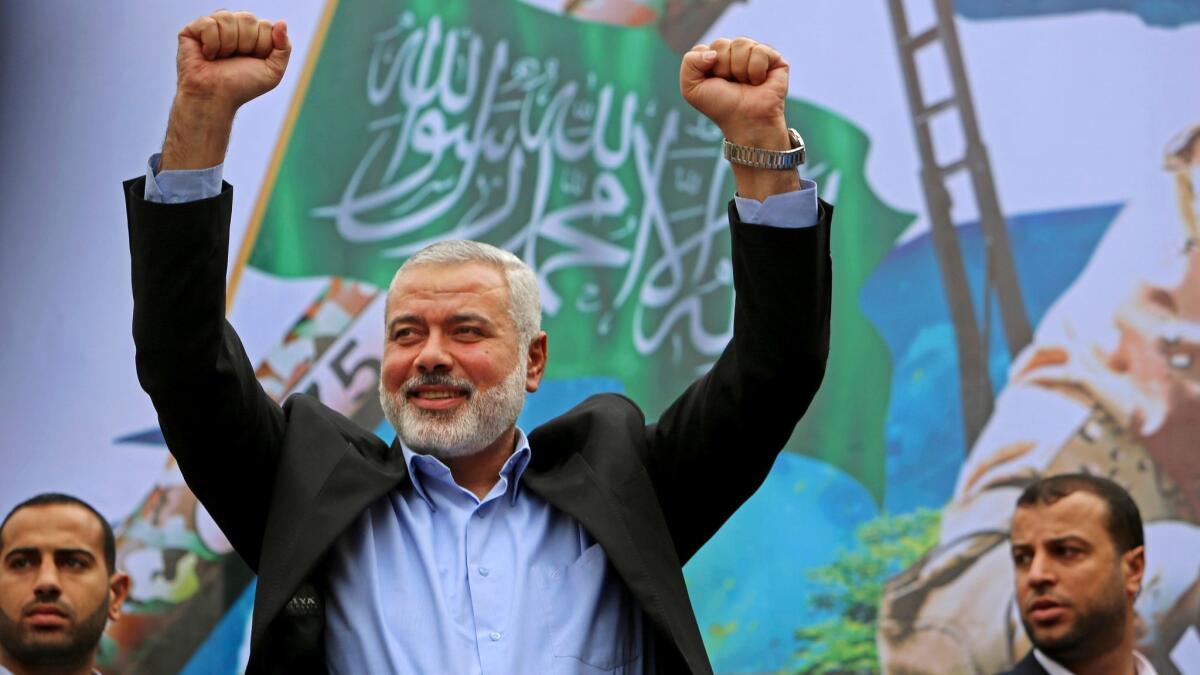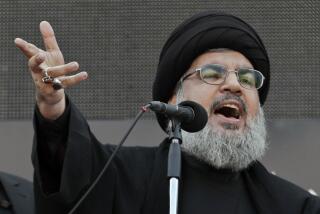Hamas selects popular Gaza politician Ismail Haniyeh as its new leader

Reporting from Tel Aviv — Hamas, the Palestinian group that controls the Gaza Strip, said Saturday that it had chosen Ismail Haniyeh, a charismatic grassroots politician, as its new political chief, the latest move in an effort to refresh the militant Islamist group’s leadership and manifesto.
Haniyeh, seen as a relative moderate with close ties to Hamas’ military wing, will move from Gaza City to Hamas headquarters in Doha, Qatar, to take over from Khaled Meshaal, who has been responsible for the organization’s foreign relations and financing for the last 12 years.
The announcement caps several months of voting among Hamas’ far-flung members in Gaza, the West Bank, Israeli jails and abroad to select a replacement for Meshaal, who sought to step down.
It comes a few days after Hamas unveiled a revised charter that eased its position on Israel and distanced itself from Islamist groups in the region in what was seen as a bid to reverse years of growing isolation in the region.
Hamas, classified as a terrorist group by the United States, the European Union and Israel, has been buffeted by upheavals across the Arab world, which resulted in bruised relations and reduced support from governments in Iran, Syria and Egypt.
While Haniyeh is expected to continue Meshaal’s program of emphasizing improved relations with Arab countries around the region and reaching out to Western countries, his ascent to the organization’s top position is seen as rebalancing influence within Hamas toward its Gaza leadership and its Qassam Brigades military wing, and away from its foreign political bureau.
“This election shifts the center of gravity in the movement to Gaza,” said Ghassan Khatib, a former Palestinian Authority spokesman and a vice president of Birzeit University. “This is probably an indication of the increase of the power of the inside — particularly the military wing.”
Haniyeh, 54, led Hamas to its 2006 victory in a Palestinian parliamentary election and served as the prime minister of the Palestinian Authority. He remained the organization’s political leader in Gaza following its takeover of the territory a decade ago from Palestinian President Mahmoud Abbas’ Fatah party as well as through years of blockade and war with Israel.
Haniyeh was radicalized by the situation in Gaza.
— Bjorn Brenner, a researcher on Palestinian politics at the Swedish Defense University
Earlier this year, Hamas selected Yahya Sinwar, a hard-line military leader, to replace Haniyeh as the top leader in Gaza — a move that many feared could help spark a new round of fighting with Israel.
Haniyeh, who served as an assistant to Hamas’ founding spiritual leader, Sheik Ahmed Yassin, and whose home is in a Gaza City refugee camp, is consistently ranked by Palestinian opinion polls as one of the most popular politicians.
“Under its new leadership, the movement must continue and intensify its efforts to strengthen internal Palestinian relations … strengthen the steadfastness of our people, and mobilize Arab, Islamic and international powers to stand by the Palestinian people,” said Hamas spokesman Fawzi Barhoum in a statement announcing Haniyeh’s selection.
Last week, Hamas unveiled a series of additions to its charter that expressed support for establishing a provisional Palestinian state in the West Bank and the Gaza Strip — seen as a tacit acceptance of Israel. The new manifesto emphasized that Hamas is first and foremost a Palestinian movement — an effort to distance itself from Egypt’s Muslim Brotherhood and improve ties with the government in Cairo. It also sought to distance the organization from the anti-Semitic language of its original charter.
A statement from the office of Israeli Prime Minister Benjamin Netanyahu rejected the revised charter as an effort to “fool the world.’’
Despite Haniyeh’s reputation as an affable leader who helped push Hamas to compete in elections that were expected to moderate the organization, the years of conflict with Israel and estrangement from Fatah have hardened the newly elected political leader and made him more inclined to go along with the military wing, said one analyst.
“Haniyeh was radicalized by the situation in Gaza,” said Bjorn Brenner, a researcher on Palestinian politics at the Swedish Defense University and the author of a book on Hamas. “He was one of the leaders who believed that participating in the political system would make the international community open their arms, strengthen the Palestinians, and force Israel to deal with Hamas. It didn’t go like that.’’
Special correspondents Abualouf reported from Gaza City and Mitnick from Tel Aviv
More to Read
Sign up for Essential California
The most important California stories and recommendations in your inbox every morning.
You may occasionally receive promotional content from the Los Angeles Times.









